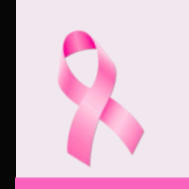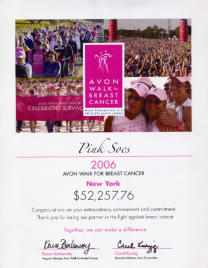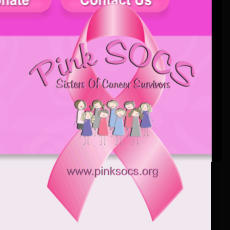






Resources
Avon Foundation Beneficiaries, Avon Foundation Breast Health Outreach Program, Avon
Foundation Breast Health Resource Guide, Young Survival Coalition, CancerCare
REMEMBER, EARLY DETECTION HELPS SAVE LIVES
•
Be
sure
you
and
your
loved
ones
follow
the
recommended
guidelines
from
the
American
Cancer
Society
for
early
detection
of
breast
cancer.
If
there
is
a
history
of
breast
cancer
in
your
family
consult
your doctor on the need to begin these steps at an earlier age.
•
Women
should
know
how
their
breasts
normally
look
and
feel
and
report
any
breast
change
promptly
to their health care providers.
•
Yearly
mammograms
with
a
clinical
breast
exam
are
recommended
starting
at
age
40
and
continuing
for as long as woman is in good health.
•
Clinical
breast
exam
(CBE)
should
be
part
of
a
periodic
health
exam,
about
every
3
years
for
women
in
their 20s and 30s.
•
Breast self-exam (BSE) is an option for women starting in their 20s.
•
Women at high risk (greater than 20% lifetime risk) should get an MRI and a mammogram every year.
•
Yearly MRI screening is not recommended for women of average risk of breast cancer.
IMPORTANT FACTS ABOUT BREAST CANCER IN THE U.S.
•
A woman has a 1 in 8 chance of developing breast cancer in her lifetime
•
Every 3 minutes, there is a new diagnosis of invasive breast cancer.
•
Approximately 230,480 women and 2,140 men will be diagnosed with breast cancer this year.
•
Every 13 minutes, a life is lost to breast cancer.
•
39,520 women and 450 men in the U.S. will die from the disease annually.
•
The
National
Cancer
Institute
estimates
that
approximately
2.6
million
U.S.
women
with
a
history
of
breast
cancer
are
living
today,
more
than
half
of
whom
were
diagnosed
less
than
10
years
earlier.
Most
of
these
individuals
were
cancer-free,
while
others
still
had
evidence
of
cancer
and
may
still
be
undergoing treatment.
•
There
are
more
than
250,000
women
under
the
age
of
40
in
the
U.S
living
with
breast
cancer,
and
over
11,000 will be diagnosed this year.
•
White,
non-Hispanic
women
are
more
likely
to
develop
breast
cancer
but
African-American
women
are
more likely to die from it.
•
Breast cancer is the most commonly diagnosed cancer among Hispanic women.
MEN GET BREAST CANCER, TOO
•
Survival
for
men
with
breast
cancer
is
similar
to
survival
for
women,
when
their
stage
of
diagnosis
is
the same.
•
Men
at
any
age
may
develop
breast
cancer,
but
it
is
usually
found
in
men
between
60
and
70
years
of
age.
•
Male breast cancer makes up less than 1% of all cases of breast cancer.
•
Male
breast
cancer
is
sometimes
caused
by
inherited
gene
mutations,
and
a
family
history
of
breast
cancer can increase a man’s risk.




© 2019 Pink SOCS Foundation, Inc., 501(c) (3) tax exempt organization
















